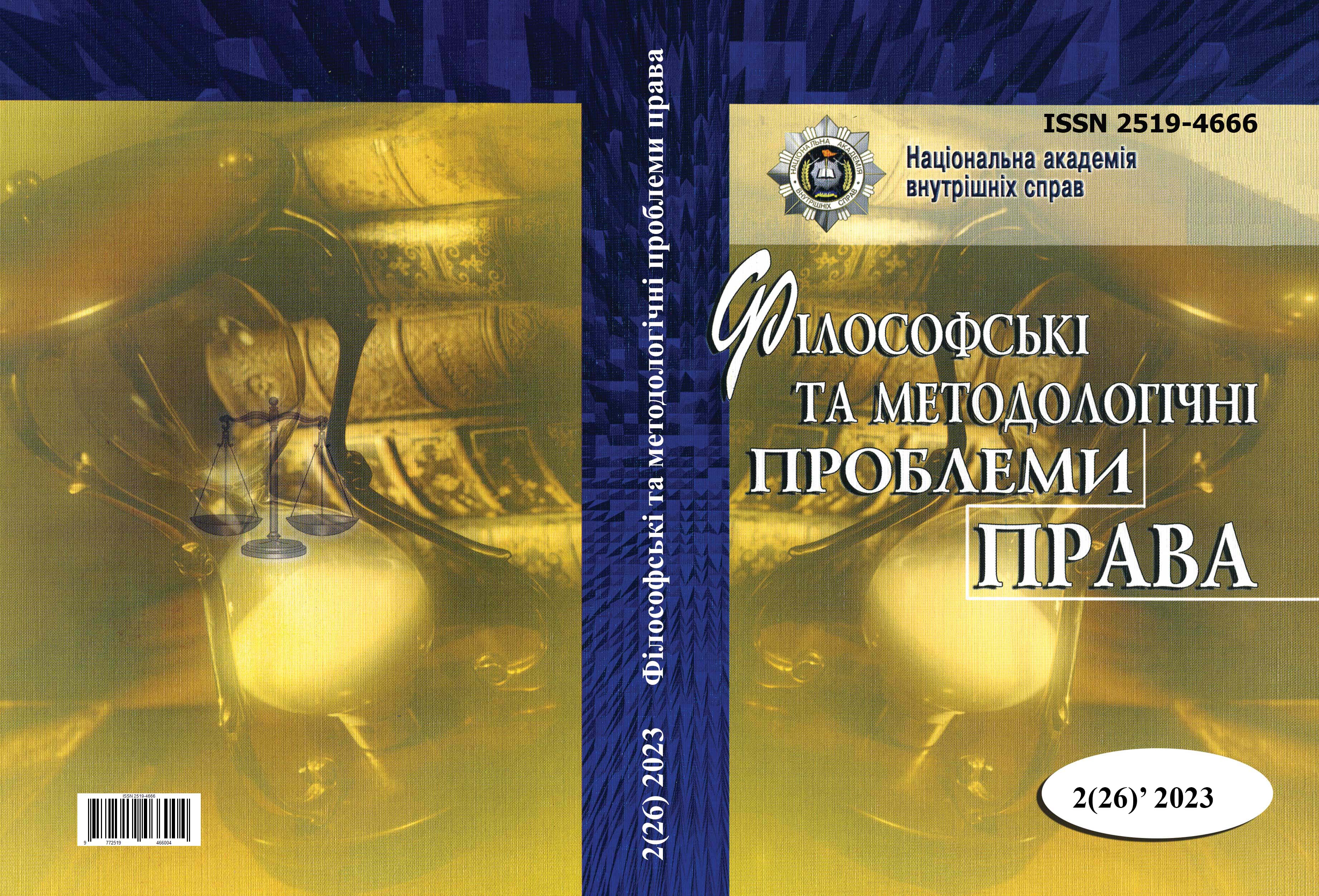Analysis of Crime: Problems of Terminology
Abstract
Abstract. The article provides a scientific review of the main modern scientific approaches to understanding crime. The systematic and phenomenological foundations of crime research are analyzed. The opinion about the fragmentation of general theoretical criminological knowledge about crime and the need to synthesize their separate elements on complementary methodological bases is supported. The concept of crime is proposed as an integral component of human relationships, which accompanies society at all stages of its development and reflects the behavior of individual individuals, which other members of society perceive as criminal offenses. The specifics of the legal approach to crime as a collective concept - a set or even a system of criminal offenses – are considered. As a result, we have the concept of crime as a set of criminal offenses of one or more types, which have a mass character and are regularly repeated in the country or a separate region during a certain period of time. this approach is the result of criminological analysis of crime. The criminological analysis itself is an approach, a component of a broader concept – "crime analysis". It has been proven that the analysis can be forensic, which is based on the norms of criminal procedural legislation and is aimed at studying the patterns of criminal activity and its reflection in information sources, which serve as the basis for the development of means, techniques and methods of collecting, researching, evaluating and using evidence for the purpose investigation, trial and prevention of criminal offences.
Keywords: crime; method; analysis; criminological analysis;, forensic analysis; criminology; criminalistics; warning; prevention.
Downloads
References
Bandurka, O.M., & Lytvynov, O.M. (2015). Crime as an object of phenomenological analysis. Law and Security, 3, 6-10. Retrieved from http://nbuv.gov.ua/UJRN/Pib_2015_3_3.
Busel, V.T. (Ed.). (2004). A large explanatory dictionary of the modern Ukrainian language. Kyiv; Irpin: Perun.
Butenko, V.B. (2022). Classification of crime prevention subjects: scientific and methodological analysis. Our right, 1, 111-117. doi: 10.32782/np.2022.1.16.
Cherniavskyi, S., Babanina, V., Vartyletska, I. & Mykytchyk, O. (2021). Peculiarities of The Economic Crimes Committed with the Use of Information Technologies. European Journal of Sustainable Development, 10(1), 420-431. doi: 10.14207/ejsd.2021.v10n1p420.
Cherniei, V., Cherniavskyi, S., Babanina, V., Tykhonova О., & Hudkova, H. (2023). Características de la responsabilidad por revelación del secreto bancario en Europa y Estados Unidos. Jurídicas CUC, 19(1), 311-338. doi: 10.17981/juridcuc.19.1.2023.11.
Cherniei, V.V., & Dzhuzha, O.M. (Eds.). (2020). Criminology. Kyiv: Maslakov.
Danshyn, I.M., Holina, V.V., & Valuiska, M.Yu. (et al.). (2009). Criminology: General and Special parts (2nd ed.). V.V. Holina (Eds.). Kharkiv: Pravo.
Hainzon, G. Sons and world domination. Retrieved from http://www.ji-magazine.lviv.ua/cgi-sys/suspendedpage.cgi.
Holina, V.V., Holovkin, B.M., & Valuska, M.Yu. (et al.) (2014). Criminology. V.V. Holina, B.M. Holovkin (Eds.). Kharkiv: Pravo.
Karpov, N.S. (2007). Forensic principles of studying criminal activity. Kyiv: KNUVS.
Kindiuk, K.B. (2017). The legal heritage of M.M. Gernet as the development of the sociological approach in jurisprudence (Doctoral dissertation, Odesa, Ukraine). Retrieved from https://shron1.chtyvo.org.ua/Kindiuk_Kseniia/Pravova_spadschyna_MM_Herneta_iak_rozvytok_sotsiolohichnoho_pidkhodu_u_iurysprudentsii.pdf.
Kuts, V. (2016). Concept of crime. Scientific journal of the National Academy of the Prosecutor's Office of Ukraine, 2, 34-39. Retrieved from http://www.chasopysnapu.gp.gov.ua/ua/pdf/10-2016/02/kuts.pdf.
Lazebnyi, A.M., & Levytskyi, A.M. (2019). Forensic support for the investigation of organized crime. International Legal Bulletin: Current Problems of Modernity (Theory and Practice), 14, 189-198. doi: 10.33244/2521-1196.14.2019.189-198.
Maslova, N.H. (2020). About the basic principles of combating crime. Pravo.ua, 1, 102-106. doi: 10.32782/LAW.2020.1.15.
Opishniak, S.O. (2022). The current state of combating crime in Ukraine. Formation and development of the legal state: problems of theory and practice, 419-431. doi: 10.36059/978-966-397-287-9-115.
Orlov, Yu.Yu. (2017). The essence and concept of crime: from fragmentation to integration of scientific knowledge. Law forum, 5, 271-278. doi: 10.5281/zenodo.1203785.
Shakun, V.I. (2019). Criminality. Great Ukrainian legal encyclopedia (Vol. 18). V.I. Shakun, V.I. Tymoshenko (et al.). (Eds.). Kharkiv: Pravo.
Shepitko, V.Yu. (Ed.). (2004). Forensics (3rd ed.). Kyiv: In Yure.
Shynkaruk, V.I. (Eds.). (2002). Philosophical encyclopedic dictionary. Kyiv: Abrys.
Tymoshenko, V.I. (2018). The social basis of crime. Bulletin of the Ministry of Justice of Ukraine, 2, 35-39. Retrieved from http://nbuv.gov.ua/UJRN/bmju_2018_2_11
Tymoshenko, V.I., & Shakun, V.I. (2021). Theoretical foundations of criminology. Kyiv: Yurinkom Inter.
Tytarenko, O.O. (2019). State crime prevention programming in Ukraine. Kharkiv: Promart.
Zakaliuk, A.P. (2007). Course of modern Ukrainian criminology: theory and practice (3rd ed.). Kyiv: In Yure.
Abstract views: 50 PDF Downloads: 299
Copyright (c) 2024 Philosophical and Methodological Problems of Law

This work is licensed under a Creative Commons Attribution-NonCommercial-NoDerivatives 4.0 International License.
- Authors reserve the right to authorship of their own work and transfer to the magazine the right of the first publication of this work under the terms of the Creative Commons Attribution License, which allows other persons to freely distribute published work with mandatory reference to authors of the original work and the first publication of an article in this magazine.
- Authors have the right to enter into separate additional agreements on non-exclusive dissemination of the work in the form in which it was published in the journal (for example, to post an article in the institution's repository or to publish as part of a monograph), provided that the link to the first publication of the work in this journal is maintained.
- The journal's policy allows and encourages the posting of articles by authors on the Internet (for example, in electronic storehouses of institutions or on personal websites), both before the submission of this manuscript to the editorial office and during its editorial processing, as this contributes to the creation of a productive scientific discussion and positively affects the efficiency and dynamics of citing the published work.




